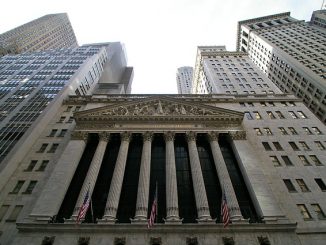- Nvidia (NVDA), Tesla (TSLA), Apple (AAPL), and Meta (META) led a sharp decline in the “Magnificent Seven” tech stocks, with losses of 9%, 12%, 8%, and 6% respectively, as an escalating U.S.-China trade war, marked by 54% tariffs on Chinese imports, triggered widespread selling on Wall Street.
- The tech rout, compounded by China’s retaliatory tariffs and earlier concerns over AI valuations sparked by the DeepSeek chatbot launch, pushed the Nasdaq Composite into bear market territory and erased over $300B from Apple’s market cap.
- While Wedbush analyst Dan Ives warned of an “economic Armageddon” for tech due to surging electronics prices, Treasury Secretary Scott Bessent attributed the sell-off to a “Mag 7 problem” rather than Trump’s trade policies alone, highlighting market overreactions to competitive and valuation pressures.

The tech sector experienced a seismic jolt on Friday as Nvidia (NVDA), Apple (AAPL), and Tesla (TSLA) spearheaded a sharp decline among the “Magnificent Seven,” with losses rippling across Wall Street amid an intensifying trade war. Nvidia, a leading force in the chipmaking industry, experienced a sharp 7.36% drop in its stock price, followed by an additional 1.81% decline in after-hours trading on Friday, bringing it down to $92.60. Meanwhile, Tesla, the electric vehicle giant, saw its stock tumble over 10%, with a further 1.75% after-hours slide to $235.25. This tandem tumble dragged the Nasdaq Composite (^IXIC) – down nearly 10% over the past five trading sessions – into bear market territory, underscoring the vulnerability of tech-heavy indices to macroeconomic turbulence. Apple, meanwhile, endured an 8% drop, printing the tape at $186.60, compounding a staggering $300-plus billion erasure from its market cap in the previous session—its bleakest performance since March 2020. Meta (META), the social media powerhouse, took a hit as well, with its shares dropping 27 points – more than 5% – and an additional 0.83% decline in after-hours trading, as the sector endured a second straight day of heavy losses.
The catalyst for this tech rout lies in the escalating tit-for-tat between the U.S. and China. President Trump’s aggressive tariff regime, which slapped an additional levy on Chinese imports, pushing the rate to 54%, triggered Beijing’s retaliatory tariffs. This trade salvo has stoked fears of a global economic downturn, with Wall Street analysts sounding the alarm over the sustainability of such policies. Wedbush’s Dan Ives, a prominent tech optimist, issued a stark warning, arguing that these tariffs threaten to dismantle the AI revolution and broader tech industry. He projected a grim scenario where electronics prices could skyrocket – iPhones potentially hitting $3,500 – eviscerating consumer demand and corporate margins alike. Ives described the policy as a misguided attempt to resurrect a bygone era of U.S. manufacturing dominance, predicting instead an “economic Armageddon” for the tech trade.
Yet, not all voices align with this dire outlook. Treasury Secretary Scott Bessent, in an interview with Tucker Carlson released Friday, pushed back against the narrative pinning the market’s woes solely on Trump’s trade agenda. He pointed to an earlier trigger: the January debut of DeepSeek, a Chinese AI chatbot developed by a startup, which rattled investors and sent Nvidia and other tech stocks sliding. That event, Bessent argued, exposed cracks in the “Magnificent Seven’s” armor – overinflated valuations and aggressive AI spending – well before the latest tariff escalation. Drawing on his hedge fund experience, he framed the sell-off as a “Mag 7 problem” rather than a broader indictment of Trump’s “MAGA” economic vision, noting that markets are prone to fluctuations irrespective of policy shifts.
The numbers paint a vivid picture of Friday’s carnage: Nvidia down 9%, Tesla off nearly 12%, Apple shedding 8%, and Meta declining 6%. These losses, while stark, reflect a confluence of pressures—trade war fallout, competitive threats from abroad, and a reassessment of tech’s growth trajectory. China’s DeepSeek announcement earlier in the year already hinted at the fragility of investor confidence in AI-driven valuations, a sentiment now amplified by the tariff standoff. Wall Street’s broader concern is the specter of a global recession if these trade barriers persist, a risk that could further erode the tech sector’s momentum. For now, the “Magnificent Seven” are grappling with a harsh reality: their dominance, once unquestioned, is being tested by forces both geopolitical and technological, leaving their future trajectory uncertain.
WallStreetPit does not provide investment advice. All rights reserved.
- Bulenox: Get 45% to 91% OFF ... Use Discount Code: UNO
- Risk Our Money Not Yours | Get 50% to 90% OFF ... Use Discount Code: MMBVBKSM
Disclaimer: This page contains affiliate links. If you choose to make a purchase after clicking a link, we may receive a commission at no additional cost to you. Thank you for your support!





Leave a Reply